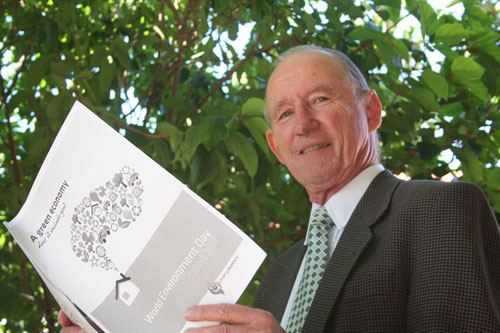
WORLD Environment Day, established by the UN in 1972 to stimulate worldwide awareness of the environment, is celebrated each year on 5 June.
The theme in this International Year of Sustainable Energy for All is “Green Economy: Does it include you?”
It raises the question: What is a green economy?
We usually associate the economy and stewardship with financial arrangements.
There are at least two problems with that.
First, we tend to relate to the Earth merely as a resource pool for us to exploit, and the natural environment by definition does not have a dollar value.
It is therefore subject to abuse and the political judgment that a liveable environment would be good if the economy could afford it.
Secondly, “economy” literally means “household management”, which means that we need to see this term more holistically with “house” defined as the Earth itself.
The term “green economy” therefore helps us to see more of the whole, and to provide a more substantial platform for management of the house.
The Christian church has a particular calling to re-vision this more holistic view of the house, which is God’s world, and of the household, which is the life God has created.
A green economy recognises that unlimited growth on a finite planet is not possible.
We need to re-image these terms to see progress and growth as the flourishing of all life, rather than the accumulation of wealth by a few at the expense of the many.
Progress needs to be seen in terms of the bringing about of the reign of God so we see a household that is more just, equitable, respectful, compassionate and loving.
If members of God’s family continue to suffer because some of us are taking too much or if many of God’s wild creatures continue to experience the threat of extinction, we are not growing a more holistic household.
The need for a green economy is of course related to increasingly obvious environmental problems, but even more it needs to be understood in the context of our most basic theology, including a doctrine of creation.
Earth care is essentially a theological issue that informs our understanding of mission.
It is therefore essential for us to revise and broaden our definition of economy to include the natural world and defy any attempt to put a dollar-only value on it.
A green economy must involve us all in our expectations, political judgments, and in every other aspect of our life.
It is at this point that stewardship becomes signifi cant; it is not the only word used to describe our calling to care for creation, but it is the most common.
In a significant book, Environmental Stewardship, Prof Sam Berry said that “stewardship is about caring”, and that involves not only everyday things and relationships we value, but also the environment.
“Put another way,” he said, “relationship is at the root of stewardship.”
In the same volume, Sir John Houghton said, “Stewardship is not an option; it is integral to God’s order in creation.”
Thus we return to the original question: does it include you?
Clearly the only possible answer is “yes”.
As church we have a responsibility to re-imagine the house in a more holistic sense and to contribute by designing systems and structures that help us live together in ways that take the whole into account.
Rev Dr Clive Ayre is a voluntary Eco-Mission Consultant for the Queensland Synod’s Uniting Green and Honorary Research Fellow at the University of Queensland.
He is presenting at the Christian Faith and the Earth conference in Cape Town in August.
For more information visit www.greenchurch.ucaqld.com.au or to download resources for World Environment Day visit UnitingJustice.
Photo : Rev Dr Clive Ayre inspects the UnitingJustice World Environment Day resources. Photo by Holly Jewell
 JourneyOnline
JourneyOnline






